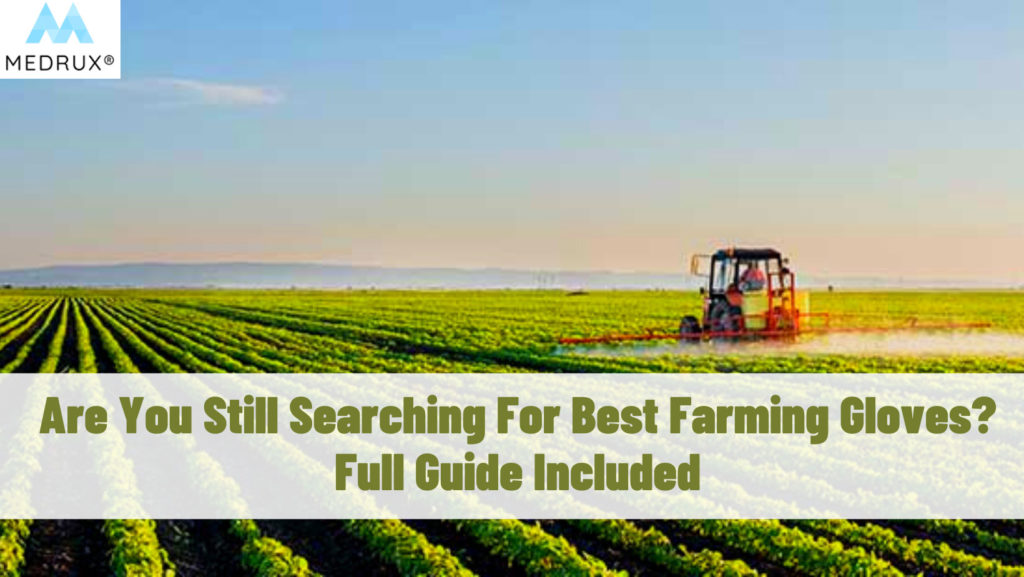Our hands perform numerous tasks for us.
They can perform various functions, including touching, gripping, feeling, holding, and manipulating.
So, they are an essential aspect of who we are and how we identify ourselves.
For instance, our hands can perform gentle and precise tasks such as letter writing, painting, and needle threading.
Also, we can do heavy work with our hands, such as digging with a shovel, swinging an axe, or using a jackhammer.
For this reason, hand protection is vital every time we use them in a workplace or other dangerous environment.
Furthermore, the employee’s and the employer’s mutual responsibility is to ensure continuous hand protection by providing and wearing appropriate safety gloves for the tasks at hand.
One of these workplaces that also needs hand protection is the agriculture industry.
People are exposed to several risks and hazards in agriculture or farming.
So, how to correctly choose suitable farming gloves before starting your job?
This is one of our main outlines for today’s topic.
Therefore, I’ve taken the opportunity to give you some background information on different farming glove options.
All you need to do is to relax and try to read slowly.
Hopefully, you will find it enjoyable.
What exactly are farming protection gloves?
Whether working on a farm or loving home gardening, wearing a glove is essential for several reasons.
There is no doubt that farm work is incredibly difficult on the hands.
For this reason, these gloves are a sort of safety protective tool that ensures the safety of your hands while working outside the home in a dangerous environment.
Besides, they enable you to continue to work rather than being prevented by an injury.
Farming gloves protect your hands and fingers from soil, thorns, and chemicals. [1]
They also protect hands from sharp or angular tools, preventing fingers and nails from wear and tear.
Why do we need to wear farming gloves?
Agriculture is a broad umbrella for many different tasks that are performed in the industry. [2]
For example, workers in the farming sector may be responsible for everything ranging from handling chemical herbicides and disinfectants to dealing with livestock and processing contaminated soil.
Although we imagine farmers with rugged hands worn from all the tasks and whether they have been forced to endure, there is undoubtedly an advantage to protecting those hands with gloves.
Herbicides, for instance, contain chemicals that can be highly damaging to the skin, so anyone responsible for applying such chemicals must be adequately protected.
The second reason is that gloves are an essential barrier to protect against the spread of bacteria and other germs when caring for livestock, especially when the animals are sick.
This is necessary because serious diseases can be transmitted from livestock to humans.
Furthermore, agricultural difficulties are not simply the heavy lifting or the machinery work; there is also the weather.
Because cold weather may impact negatively on exposed skin, causing your hands to become chapped and irritated.
Then a decent pair of gloves will keep your hands warm, dry (even in the rain), and safe from occupational accidents.
Also, do not forget that gloves are also essential in gardening.
Because behind every marvelous, plentiful garden is a lot of hard work.
Then, whether you are a farmer or just love home gardening, gloves may make both jobs simpler, cleaner, and more pleasant.
Selecting the suitable farming gloves for each task
You should choose a glove based on your level of activity. [3]
There are two classifications of farming gloves: according to the material used or according to the job.
So, Leather or synthetic suede gloves are the perfect all-purpose gloves.
Because both materials are resistant to wear and tear, they will not stretch, shrink, or break.
But cotton or other lightweight glove is suited for light work such as watering.
Remember that cotton gloves will get soaked quickly and are not helpful in wet soil.
Moreover, cotton gloves will not adapt to your hand as well as leather ones, so be sure your option suits you comfortably.
In the case of heavy-duty tasks, choose a work glove that’s up to the task.
Look for a heavy-duty material that doesn’t get sodden when wet.
Heavy-duty jobs require using a thick and resilient glove manufactured from an impenetrable material.
Also, ensure the gloves are reinforced in areas needed for hard work, such as the palm and under the fingers.
Besides, resistant glove materials are the right choice for work involving chemicals such as pesticides.
Some of the most chemical-resistant gloves are very thin and meant to be worn for a short time.
Moreover, no glove can withstand all substances equally well.
Therefore, the glove must be solvent-resistant in the case of liquid concentrates.
But for water-based pesticides, wettable powders, or granular products, you can select a more comprehensive selection of natural rubber, neoprene, polyvinyl chloride, and polyethylene.
These gloves are made of very flexible material, giving you the bare hand’s sensitivity.
Sometimes farming requires a delicate touch, such as transplanting seedlings, tying twine, or cutting flowers.
Furthermore, when selecting a pair of farm work gloves, there are four essential factors to consider.
These components are as follows:
-
Insulation
First, suitable insulation for farm labor gloves would be between 100 and 150 grams, lightweight insulation.
This will provide sufficient warmth for your hands while trying to maintain dexterity.
-
Lining
Secondly, you need a liner that will drain moisture away from your hands to ensure that even when you sweat, your hands will remain dry throughout the day.
-
Insert
Thirdly, the glove insert is that piece of the glove situated between the insulation and the shell.
This is also important for maintaining dry hands during the workday.
Choosing a synthetic material that can be washed and hung to dry is better.
You need a waterproof insert that is also breathable.
-
The outer shell
Finally, choosing a work glove with a windproof fabric will aid in keeping your hands warm without the additional bulk of thick material.
This is vital for agricultural workers because you must ensure tactile sensitivity and dexterity to execute your duties.
Disposable Gloves for Farming and Agriculture
As we mentioned before, gloves are an absolute must-have for any farm or agriculture business, whether workers are dealing with pesticides or working with animals. [5]
This is because they effectively assist in preventing bacteria and toxic chemicals from getting into contact with animals or workers’ skin.
Research shows 75% fewer bacteria on used gloves than on bare hands.
Therefore, this simple management approach may help minimize the spread of infectious and environmental pathogens by 50% between quarters and cows.
Of course, as stated in this article, you can select from a more comprehensive selection of materials such as natural rubber, neoprene, polyvinyl chloride, and polyethylene.
But mainly, Nitrile gloves are generally used with pesticides due to their rigid and chemical-resistant properties.
On the other hand, Vinyl gloves are the ideal choice to wear while dealing with livestock, as their design allows easy donning and removal of gloves.
Ultimately, it is important to follow recommended hand sanitizing practices between tasks.
Proper disposal of each glove after using them once.
In particular, reusing single-use gloves makes them brittle, causing frequent tears and an increased risk of udder contamination.
Do you wear gloves while milking cows?
Some farmers are experiencing milk quality issues on their farms without understanding their reasons.
Bacteria that cause infectious mastitis on a farm are challenging to treat, causing farms to lose milk production and money.
Unfortunately, this bacteria may spread from quarter to quarter via milk on your hands or within the milking unit.
Cows suffering from infectious mastitis frequently have a high somatic cell count in their bulk tank (SCC).
Farmers should take every precaution possible to prevent bacteria from spreading to other herd members or within the udder.
Gloves are required in today’s milk market to obtain the best premium for your farm.
Also, It should be included in your regular operating procedures and mandated that all staff wear them.
In summary, wearing gloves is a low-cost strategy to help lower total herd SCC without making a significant investment.
Considerations for choosing Farming Gloves
When choosing hand protection in general, the recommended approach is to:
- Identify the hazard and assess the level of risk
- Determine the properties of the hand protection required
- Compare the available product options and consider the environment
- Check product conformity to directives and standards
- Document the assessment process and rationale for selection
Also, keep these things in mind when you buy your next pair:
-
Glove fit and length
The glove manufacturer usually includes a chart that converts numerical size to small, medium, large, and so on.
It should be snug but not tight, and your fingers should feel comfortable while allowing free movement.
In fact, gloves that are overly large may be clumsy and uncomfortable to use, and they may get tangled in the equipment.
If gloves are too small, they will stretch, making them more challenging to put on and take off and thinner, providing less protection.
On the other hand, the length of your gloves should vary depending on the task.
A glove should cover your wrist and be roughly 12 inches long for most tasks.
However, you can get elbow-length gloves if you need to reach into chemicals.
-
Glove thickness and tear resistance
Thicker gloves usually provide additional protection since they are more resistant to tearing and puncture, but they can also impair your grabbing ability and manual dexterity.
Therefore, you should put the glove on and test it by picking up a pencil or coin.
Besides, search for a padded palm, puncture-resistant material, and extra padding over the knuckles to protect the back of your hand from thorns.
-
How to wear farming gloves?
Always keep a few more clean, additional pairs of gloves on standby.
Wear protective gloves over your sleeve cuffs unless you are working in a drenching spray from above.
Then, place the gloves under your sleeves to prevent the chemical from running down your sleeve and arm.
At the end of the day and after use, put gloves back in a bag to avoid contaminating the surfaces with which they come into contact.
-
Clean the gloves
Although washing gloves helps reduce contamination on the exterior, some contamination may be retained due to the thickness of the gloves. [5]
First, rinse your gloves under running water before you take them off, if this is possible.
Then, if you wish to reuse them, wash the outside with soapy hot water.
It is essential not to use bleach or solvents as these oxidizing agents can cause discoloration.
Do not forget that disposable gloves may only be worn for a few minutes before being thrown away.
Finally, allow your gloves to air dry to avoid material shrinking and retain their optimum size.
-
Taking gloves off
The first step is to take one glove off by gripping the cuff, then hold it wrong-side out in hand without a glove until you pull off the other.
Ultimately, both gloves will be wrong-side out with the contamination inside.
Of course, remember that you can never pull gloves off with your teeth and mouth.
-
Glove disposal
All gloves must be replaced regularly.
So keep an eye out for the following warning signs that indicate when reusable gloves need to be replaced:
- Staining or color change
- Softening, swelling, or bubbling
- Stiffening or cracking
- Dissolving or getting jelly-like
- Leaking
But if you must discard gloves, chop the fingers off so that no one else will be persuaded to use them.
Moreover, gloves are created to protect you from deadly substances.
Then, if they are not correctly disposed of, the same elements can end up causing harm to human life and the environment.
What is the difference between a garden and a farm?
The growing popularity of small-scale sustainable agriculture, particularly in cities, has blurred the distinction between the two. [6]
Even agricultural professionals sometimes become confused.
But in this case, it seems that size matters indeed.
A crucial distinction comes from this tangle of stereotypes:
A garden produces food for personal consumption, while a farm produces food (or flowers or fiber) for the benefit of others.
Furthermore, making money — not only by producing but also by selling — distinguishes gardening from farming.
Because of the market demand, farms that grow fruits and vegetables must ship out near-perfect-looking products and waste enormous volumes of supply that do not meet consumer expectations.
However, a small hole in a leaf or a blemish on fruit in a garden is not really a big deal.
Gardening is not only less risky financially but also significantly less risky physically than what one would encounter on a typical farm.
On the other hand, farms that raise livestock to face additional risks from the animals they raise.
Besides, deploying mechanical tools all around the place is not an easy job for everyone.
For instance, A tractor weighs more than ten tonnes, and its associated equipment represents far more danger than harvesting broccoli or tomatoes.
Finally, this will somehow affect your choice of protective hand gloves.
Conclusion
Farming can be incredibly satisfying but highly physically demanding and, at times, dangerous.
For example, working with machinery and cattle can be risky.
Besides, hundreds of different kinds of herbicides and insecticides are used in agriculture, each containing compounds that can be potentially harmful to humans.
Of course, you can take precautions to decrease the risk of injury to yourself and others.
This is why, with these risks, farm workers need a glove resistant to chemicals and bacteria.
Be aware when wearing gloves near moving machinery parts, as gloved hands may be drawn into machines and the hands severely injured.
Rinse and disinfect your gloves properly after applying chemicals and before removing them.
Then wash your hands again after removing your gloves.
Remember to always have spare gloves on standby.
Throw away worn disposable gloves and replace them with a new pair.
There is an easy technique to find out if the gloves leak.
Fill them halfway with water and squeeze the top shut.
If water comes from the palm or fingers, you should replace the gloves.
Also, Leather gloves are perfect for heavy jobs, whether mechanical or others.
They are preferred because they offer a high gripping ability and protect the hands when working with rough or abrasive materials.
Take price into consideration as well.
In the end, I hope that we managed to give the ultimate guide before your selection.
Stay happy, and protected.
Hajar Nagdy is a microbiologist and a lecturer. Nagdy holds a Bachelor’s degree in the fields of microbiology and environmental sciences, and she is now a M.Sc. candidate in microbiology. In her free time, she can be found listening to classical music, reading interesting scientific articles, running a charity, or traveling across Europe.








